Understanding vocabulary words. A key component of a student’s ability to comprehend the larger text. As teachers we spend so much time with vocabulary words: explicitly teaching them to students, working on frayer models together, creating language rich environments in which our students get an opportunity to use their vocabulary words in context. But if you’re only teaching the vocabulary words that appear in the teaching manuals that go with your story of the week, then students are missing a huge sector of vocabulary words they will need to be successful on those dreaded state tests. Students need explicit teaching to these test taking vocabulary words, as well as plenty of exposure before testing day.
Academic vocabulary was something I neglected for a long time before I realized the importance it could make for my students when it came to how they performed on assessments. In this blog post, I’ll share some of the biggest tips and tricks I now use in my own classroom. These tips have greatly impacted my students performance.
What is academic vocabulary ?
Before we can jump into teaching academic vocabulary, we have to understand what it is. Typical vocabulary instruction in elementary school classrooms focuses on a set of words that accompany whatever text or unit your students happen to be studying. These words are specific to the topic at hand. Academic vocabulary, or test taking vocabulary words, are the words that students most often encounter in an educational setting. In this particular case, they are words that show up in those big state test questions.
A major challenge I have found as a third grade teacher and these big state tests is often when working through the practice material provided, I’ll find many of my students cannot read the academic language of the questions. If they are struggling to simply decode and read the question, how can they accurately show what they know? These academic vocabulary words often are multisyllabic, start in similar ways to other academic vocabulary words, and rarely show up in a students regular reading material. Yet, it is imperative a student be able to decode and understand what each of these says and means. Being able to decode the word is their best chance to move forward with how to answer the question.
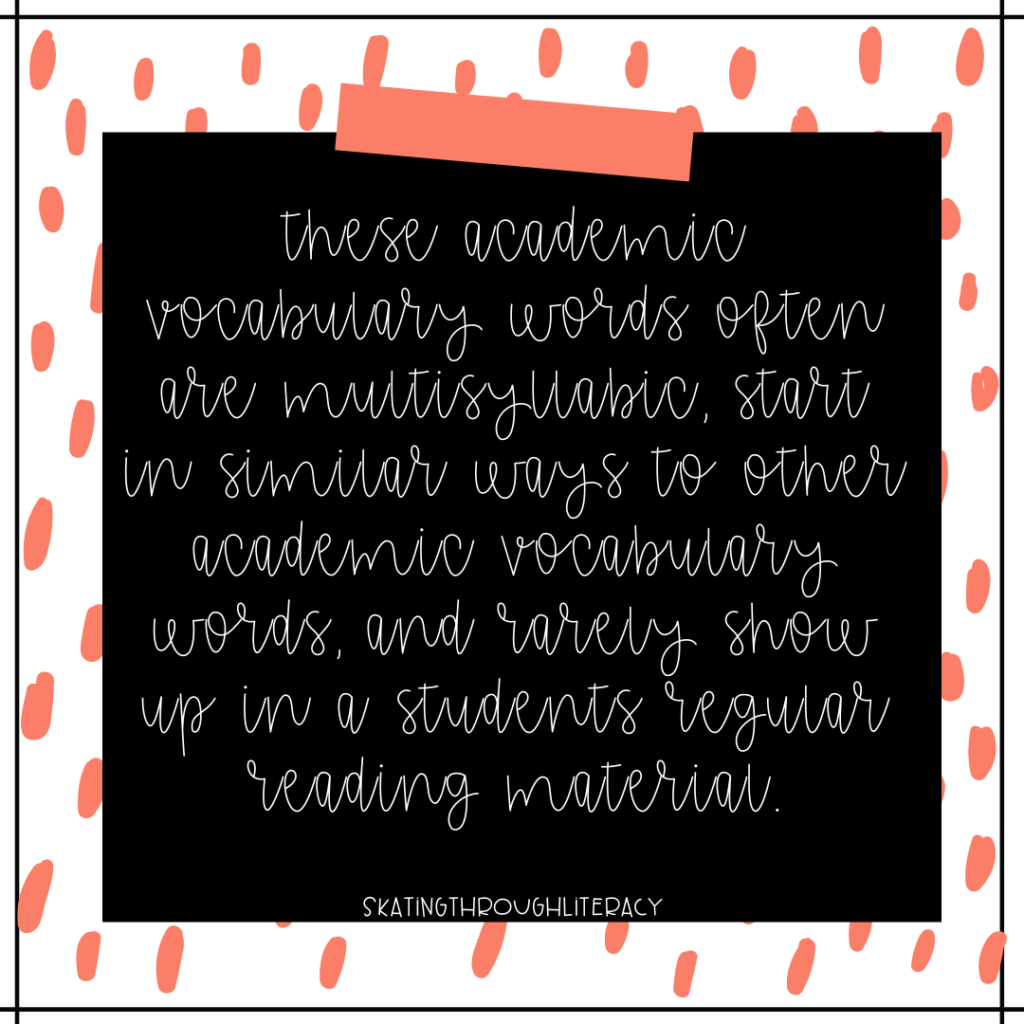
Words for test
Identifying which test taking vocabulary words to teach your students luckily is not too much of a guessing game. Open up to any assessment you give your students and immediately you will start to notice words that appear again and again. These words might include identify, support, provide evidence, inference, draw a conclusion, and summarize. Being able to decode these words and comprehend what that word is asking them as a student to do is key to their success.
These academic words for the test I refer to as Power Words with the students. We flex our muscles when we say power, we act it out, and we bring the drama. We refer them as power words because if we master these power words they will help us power through our test. Understanding these words is our way to flex our muscles on the test. If we can understand the question being asked of us, we can show our best effort.
Teaching vocabulary and pronunciations
Early in my career, before I became educated around the science of reading, I thought pure memorization of these words was the only way to go. I taught these test taking vocabulary words much like I taught sight words: skill and drill memorization. Over and over and over again. Some students, after so much repeated practice, began to memorize these words. However, many more never mastered the words before the test. As I became more educated in the science of reading, I realized I was going about it all wrong. Students need to be able to decode these academic words as they come across them during a test.
Now when teaching these power words, I start with a lesson on decoding multisyllabic words. We review our strategies for what to do when we get to a word we don’t recognize. By the time I introduce these power words to students, they have already had much practice on 2 syllable words and strategies for decoding unknown words. For more information on decoding words be sure to check out this blog post on how to decode and teach multisyllabic words.
We use these strategies we’ve used all year to then practice simply decoding and pronunciation the power words correctly. We do this by identifying our vowels and consonants, identifying where the syllable breaks go, and looking at each syllable for what we know and recognize about it. This awareness of words and being able to break the word down so explicitly helps students to truly decode and own a word, rather than simply memorizing it off a notecard.
How to build academic vocabulary
After we explicitly practice decoding each word, we then begin to jump into meaning. How fast or slow we go about this depends on each class and each year. There are groups in which developing one word a week was the right pace for their needs. Also there have been groups in which we could develop a word a day. I utilize word mats and vocabulary templates in which we can explicitly discuss each words definition, a mental image to think about, and an example of a test question. This should be done explicitly in whole group led by the teacher.
Test prep vocabulary
Once the power words have been explicitly taught through decoding strategies and developed through in-depth meanings of the word, students are ready for the repeated practice of these words. Students need many exposures to the words in many ways in order to help them become a part of their working memories. I like to use word cards and definition cards for many different applications. Using these word cards and definitions also helps me with prep because I can use the same prepped cards in many different ways. Here an example of what I might do in a sequential order:
Step 1- Decoding:
The first step in exposing students to this academic language is to help them be able to decode the words on their own. Students need multiple exposures and explicit instruction on to how to decode these words when they encounter them in reading.
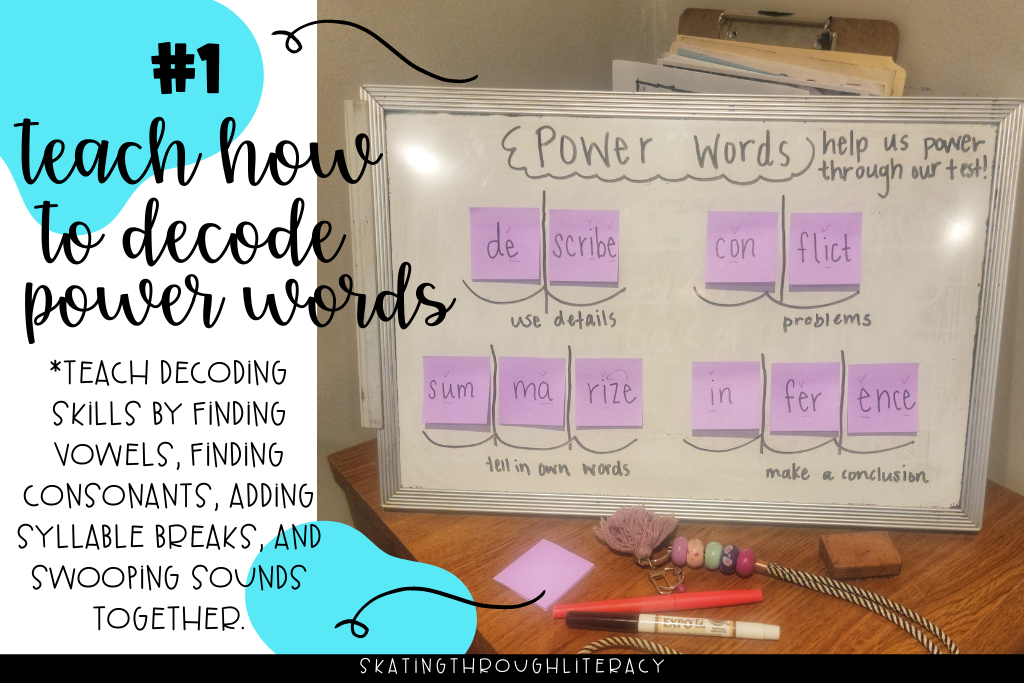
I have a few instagram reels too that walk through this process and how I do this with kids. Check out this one where I show how to decode some academic language.
Step 2- Vocabulary Mapping Placemats:
Another great way to dive in deep to the meaning of each power vocabulary word is to focus on one word at a time. These mapping templates let students really dig into a word and what it means. Students cane do one of these a day to increase their understanding of test taking terms.
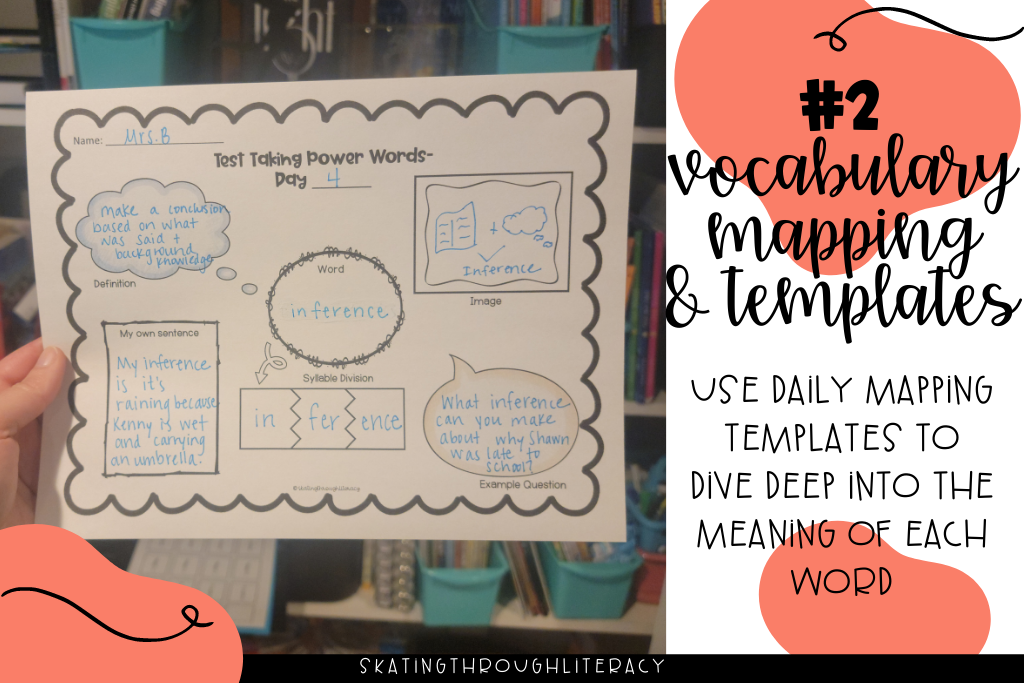
Step 3- Match ups:
Give students power word cards and their definitions. Have students simply sit on the floor or a large desk space and match up each power word to it’s definition. This helps solidify some of the words that may have similar definitions and can lead to a powerful conversation.
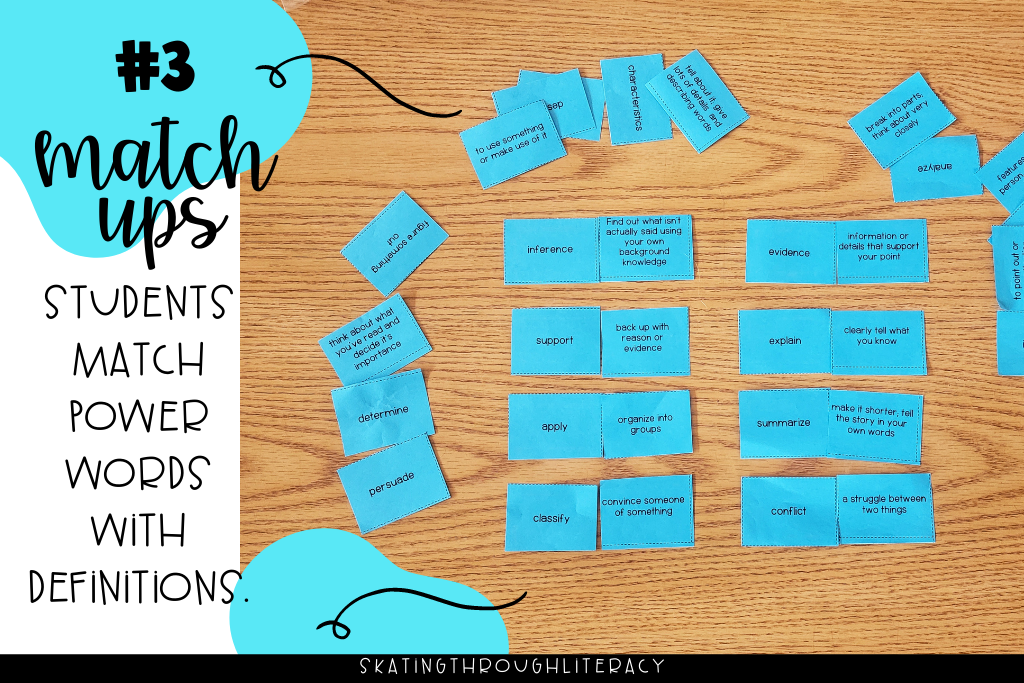
Step 4- Cut & Paste:
Give students the power words on an answer board with the definitions in strips. Students cut out definitions and glue them on top of the power word it belongs with.

Step 5- Student match up:
Give each student in the room one card; either a definition or a power word. Have students find their match in the class. To add a level of engagement, you could time students and repeat multiple times. You could also do this in teams.
Academic vocabulary activities
Now that you’re a master at teaching academic vocabulary, there are many games and activities you can introduce to your students for that added element of fun and engagement. There are so many vocabulary games you can find online that you could easily incorporate to these power words. Some of my favorites include Bingo, Memory, and Headbands. The more games and exposure to these academic vocabulary words you can provide your students, the more successful they will be when it comes to mastering those end of the year tests.
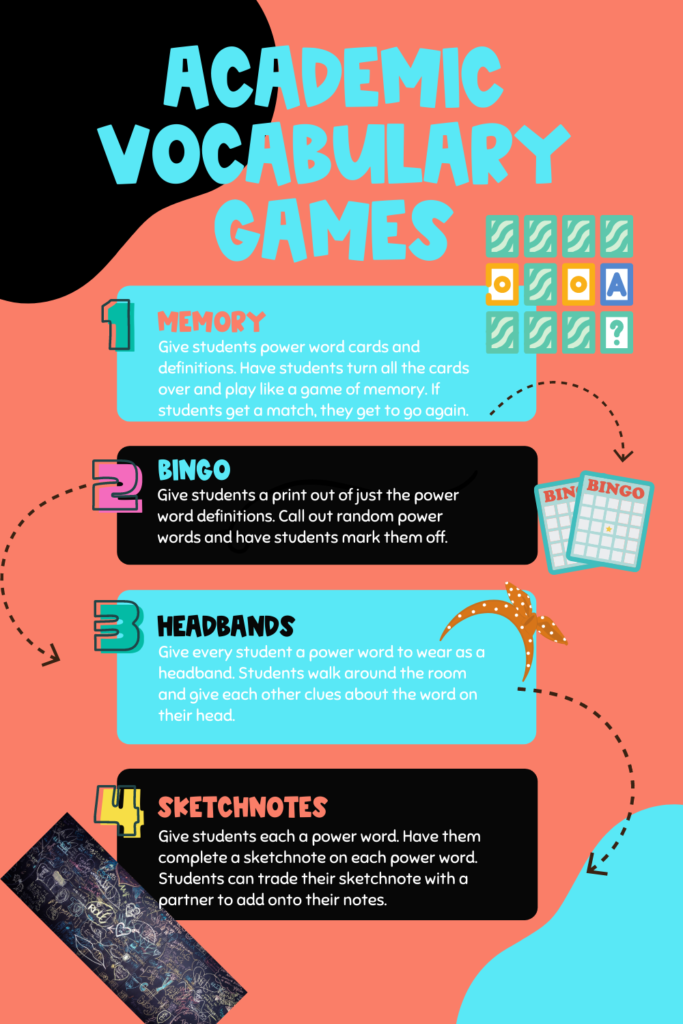
If you’ve never played headbands before in the classroom, check out this article by Stephanie Nash that will walk you through the ins and outs of how to get started! I also love this video that gives you a quick tutorial of how to use sketchnotes in your classroom.
You are more than ready to now help your students master these power words and flex their academic muscles on the upcoming testing season. Try out some of these strategies in your own classroom and let me know how it goes!
Happy teaching!


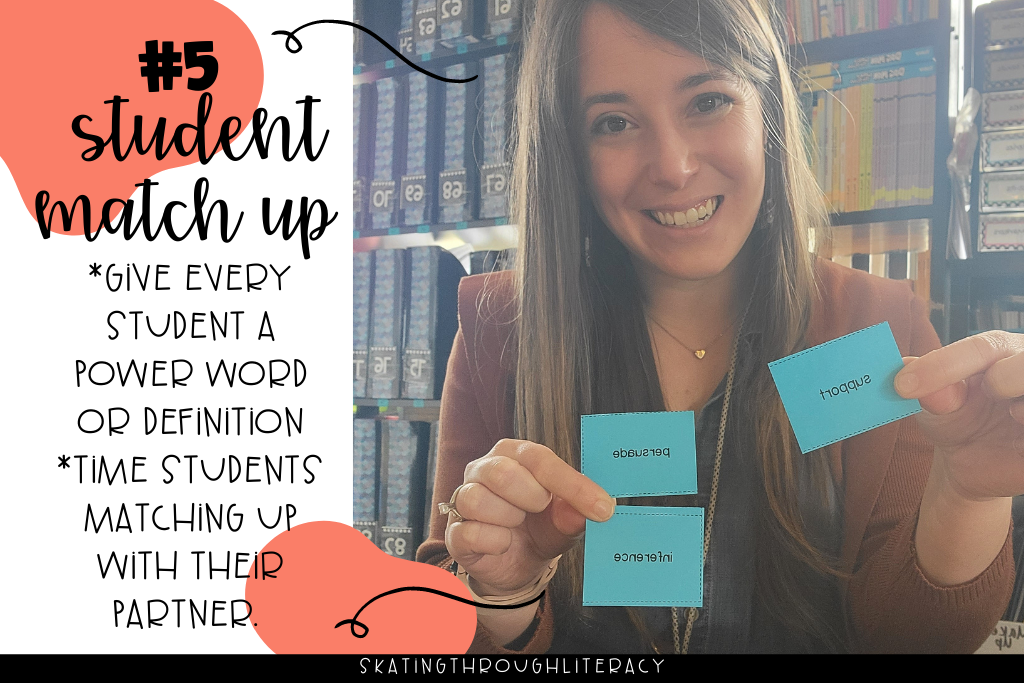
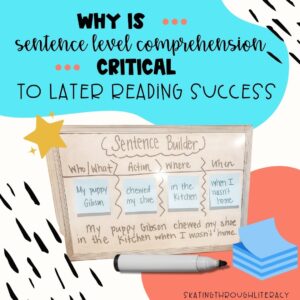

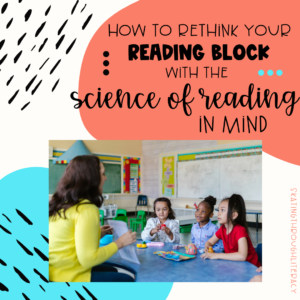

One Response
These are great activities for word work. We are just getting started with SOR and are looking for ways to incorporate vocabulary weekly. There are great worksheets here. Are they available for purchase? I couldn’t find them in your store.
Thank you!